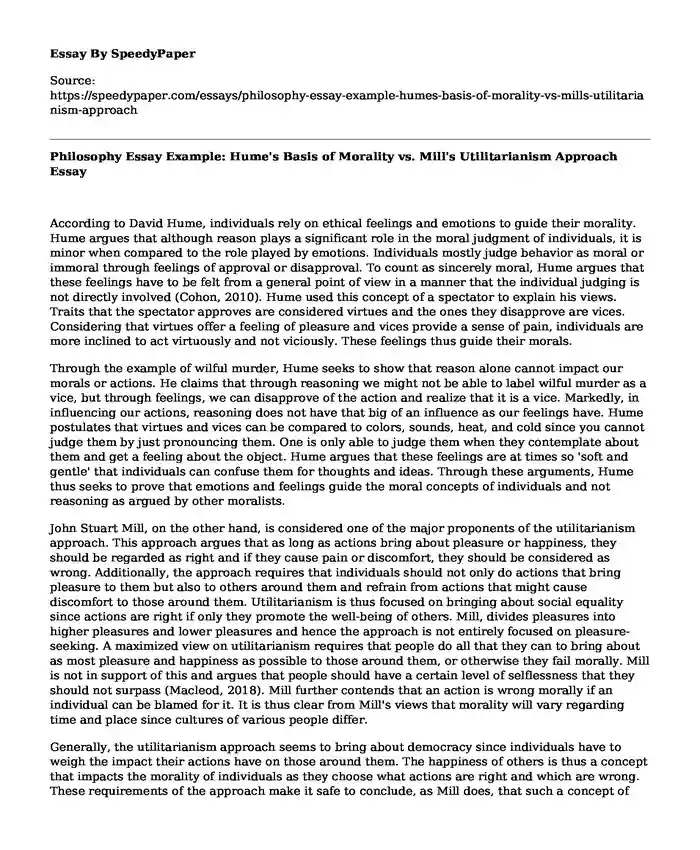
| Type of paper: | Essay |
| Categories: | Philosophy |
| Pages: | 3 |
| Wordcount: | 641 words |
According to David Hume, individuals rely on ethical feelings and emotions to guide their morality. Hume argues that although reason plays a significant role in the moral judgment of individuals, it is minor when compared to the role played by emotions. Individuals mostly judge behavior as moral or immoral through feelings of approval or disapproval. To count as sincerely moral, Hume argues that these feelings have to be felt from a general point of view in a manner that the individual judging is not directly involved (Cohon, 2010). Hume used this concept of a spectator to explain his views. Traits that the spectator approves are considered virtues and the ones they disapprove are vices. Considering that virtues offer a feeling of pleasure and vices provide a sense of pain, individuals are more inclined to act virtuously and not viciously. These feelings thus guide their morals.
Through the example of wilful murder, Hume seeks to show that reason alone cannot impact our morals or actions. He claims that through reasoning we might not be able to label wilful murder as a vice, but through feelings, we can disapprove of the action and realize that it is a vice. Markedly, in influencing our actions, reasoning does not have that big of an influence as our feelings have. Hume postulates that virtues and vices can be compared to colors, sounds, heat, and cold since you cannot judge them by just pronouncing them. One is only able to judge them when they contemplate about them and get a feeling about the object. Hume argues that these feelings are at times so 'soft and gentle' that individuals can confuse them for thoughts and ideas. Through these arguments, Hume thus seeks to prove that emotions and feelings guide the moral concepts of individuals and not reasoning as argued by other moralists.
John Stuart Mill, on the other hand, is considered one of the major proponents of the utilitarianism approach. This approach argues that as long as actions bring about pleasure or happiness, they should be regarded as right and if they cause pain or discomfort, they should be considered as wrong. Additionally, the approach requires that individuals should not only do actions that bring pleasure to them but also to others around them and refrain from actions that might cause discomfort to those around them. Utilitarianism is thus focused on bringing about social equality since actions are right if only they promote the well-being of others. Mill, divides pleasures into higher pleasures and lower pleasures and hence the approach is not entirely focused on pleasure-seeking. A maximized view on utilitarianism requires that people do all that they can to bring about as most pleasure and happiness as possible to those around them, or otherwise they fail morally. Mill is not in support of this and argues that people should have a certain level of selflessness that they should not surpass (Macleod, 2018). Mill further contends that an action is wrong morally if an individual can be blamed for it. It is thus clear from Mill's views that morality will vary regarding time and place since cultures of various people differ.
Generally, the utilitarianism approach seems to bring about democracy since individuals have to weigh the impact their actions have on those around them. The happiness of others is thus a concept that impacts the morality of individuals as they choose what actions are right and which are wrong. These requirements of the approach make it safe to conclude, as Mill does, that such a concept of morality is likely to bring about social equality and personal development.
References
Cohon, R. (2010). Hume's Moral Philosophy. The Stanford Encyclopedia of Philosophy.
Retrieved from https://plato.stanford.edu/archives/fall2010/entries/hume-moral
Macleod, C. (2018). John Stuart Mill. The Stanford Encyclopedia of Philosophy. Retrieved from https://plato.stanford.edu/archives/spr2018/entries/mill
Cite this page
Philosophy Essay Example: Hume's Basis of Morality vs. Mill's Utilitarianism Approach. (2022, Jun 08). Retrieved from https://speedypaper.net/essays/philosophy-essay-example-humes-basis-of-morality-vs-mills-utilitarianism-approach
Request Removal
If you are the original author of this essay and no longer wish to have it published on the SpeedyPaper website, please click below to request its removal:
- Research Methods
- Free Essay Sample on Diversity Management
- Free Essay about Intergovernmental Relationships and Policing
- User Interface Analysis in Our Free Essay for Everyone
- Impact of Competition between Big Business and Labor on the Advancement of History
- Information Technology Project Management
- Essay Example: Changes in Human Behavior
Popular categories




